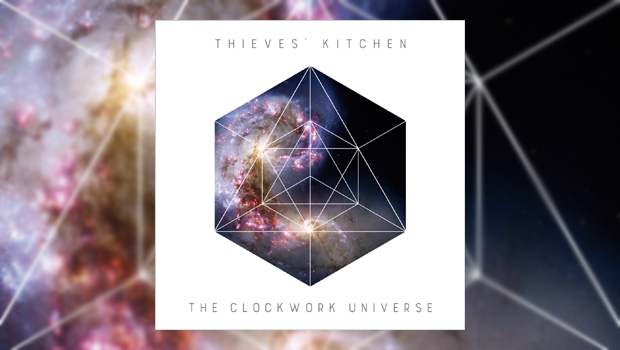Comparisons can be trite, but in striving for ever more convoluted, or conversely concise ways of describing low profile bands to potential listeners it is always well to remember that “a dichotomy of complicated note flurries mixed with simple yet winning vocal delivery resolved over the course of a twenty minute epic by consummate and mighty chops” may not cut the mustard. So, trite it may be, but imagine if Steve Howe had been the guitarist for National Health in a mash-up with Pentangle, that would be as good a place as any to start with this individual band of studio troubadours.
My own description in quotes above applies to the centre piece of The Clockwork Universe, the sixth album by long running Anglo-Scandi co-operative Thieves’ Kitchen. Based in Swindon, the core of the band comprises guitarist Phil Mercy, singer Amy Darby and the now ex-Änglagård keyboard player Thomas Johnson. As with 2013’s wonderful One For Sorrow, Two For Joy these three are again joined by ex-Sanguine Hum drummer Paul Mallyon and Änglagård’s Anna Holmgren, who this time round brings along her band mate Johan Brand and his mighty bass guitar. Despite the presence of so many from the Swedish band, the sound produced by Thieves’ Kitchen bears little relation to the Gothic folk-prog myth making favoured by Änglagård. This delightful and precise work is a place where everything locks together in harmonious movement in what at first may seem an incongruous mix, but by the end will have you hitting repeat. On first hearing it may be tempting for the newcomer exploring the cupboards of this Kitchen to say “there is too much music”, but that is akin to saying Bob Dylan writes too many words or Jackson Pollock uses too many colours. Have patience, and this fine album will reveal its secrets to become a fully rounded listening experience, sometimes taking a similar path to its goal to that wended by Gentle Giant.
Amy Darby has one of those unaffected voices that trace a lineage of female contemporary jazz and folk singers back to Barbara Gaskin, Jacqui McShee, et al, and in places, even Joni Mitchell is brought to mind. The overall feel is of a decidedly folk-tinged Canterbury air, but fronted by the lush occasionally jazz, occasionally prog rock-styled guitar of Phil Mercy, who is certainly influenced by Steve Howe, as I intimated above, and influences do not come much better than that. When Johan Brand is adding his best pounding Rickenbacker bass sound to the mix, then the “Yes go to Canterbury” bus is well and truly on the road, particularly so with the intro to Prodigy. Suffice to say none of this is plagiaristic or intentional, and the end result is Thieves’ Kitchen and no-one else.
The female vocals and musical structure also link this band to contemporary acts across The Pond, such as the hugely entertaining Moe Tar from the USA, and Canada’s Half Past Four, two bands I can’t recommend highly enough. Mixing their jazz-inflected prog grooves with their long retained folk traits, Thieves’ Kitchen make this a highly enjoyable and involving trip.
An album to get lost in, the intricacy is combined with great delicacy on the baroque piano ballad Astrolabe and its instrumental companion, the beautiful closer Orrery, tracks that punctuate the longer vocal songs. Surrounding those two tunes we have all manner of complex instrumentation always delivered without bombast, complementing the theme of the album perfectly, which narrates stories of naturally imperfect human contact and interaction with precise science and technology.
The focal point of the album is the twenty minute The Scientist’s Wife, a tale of a spouse’s estrangement to her husband’s questing obsession, and a “long ’un” that fully justifies its length. The music drives along with purpose searching for the end goal in much the same way as the protagonist’s husband is striving for his own answer. It takes over five minutes before the “wife” makes herself heard, calming the building musical insistency to sing her lament for days past when she was the light of her husband’s eye, only to be slowly martyred on the altar of the grand experiment. Some lovely flute work from Anna Holmgren only serves to underline the melancholy…“When I sing, I sing alone; I’m fading to grey”. The experiment recommences, the band let loose amongst the unfathomable cogs and pivots. Some great guitar work from Phil bursts through the intricate turning mechanisms, before we return to melancholy, ending with “Charming strangeness, a beautiful mind” from Amy and followed by Anna’s sad flute. Quite lovely.
While One For Sorrow, Two For Joy was wrought mostly from the band’s folk influences, this fine follow-up is coming along a rockier road, but is still permeated with the old yet ageless pastoralism that the band has made their own. Dusty yet simultaneously modern, the themes and music of The Clockwork Universe enmesh perfectly. The two instrumentals I mentioned earlier in this piece for instance both refer in their titles to antique astronomical measuring devices, making a direct connection with our scientific past.
This is yet another release in the ever-increasing tsunami of releases that is deserving of your attention, and anyone with a liking for intricately crafted music with thoughtful lyrics and fine singing should invest in The Clockwork Universe. Thieves’ Kitchen appear to remain a studio-only project, which is a great shame as I for one would love to see and hear this marvellous music in a live environment.
TRACK LISTING
01. Library Song (6:48)
02. Railway Time (7:39)
03. Astrolabe (3:18)
04. Prodigy (9:07)
05. The Scientist’s Wife (19:59)
06. Orrery (4:42)
Total time – 51:15
MUSICIANS
Amy Darby – Vocals
Phil Mercy – Guitars
Thomas Johnson – Keyboards
~ with:
Paul Mallyon – Drums
Johan Brand – Bass
Anna Holmgren – Flute
ADDITIONAL INFO
Record Label: Independent
Catalogue#: n/a
Year Of Release: 2015
LINKS
Thieves’ Kitchen – Website | Facebook | Bandcamp
The Merch Desk – Shop

